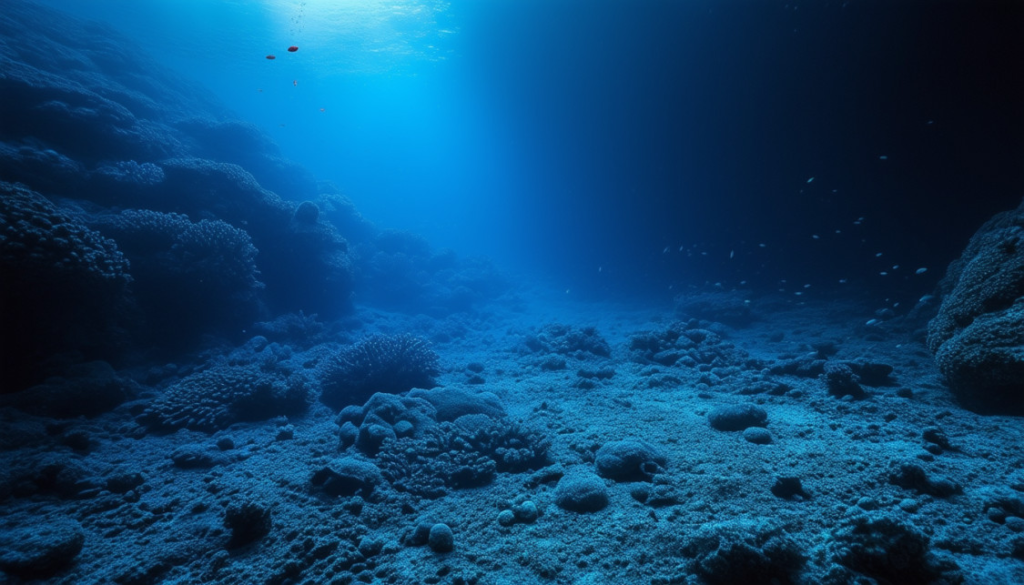The deep ocean remains one of the most mysterious and unexplored regions on Earth, holding countless secrets about our planet’s history and environmental processes. Recently, a groundbreaking discovery has revealed previously unknown processes occurring in the depths of the ocean, offering fresh insights into the complex dynamics of our marine ecosystems. These findings could change the way we understand oceanography and the role of the oceans in regulating the Earth’s climate.

The Mystery of the Deep Ocean: A Hidden World
The deep ocean, defined as the area below 200 meters, makes up more than 95% of the ocean’s volume. Despite its vastness, it remains largely unexplored due to its extreme conditions, including high pressure, low temperatures, and complete darkness. However, advancements in technology have allowed researchers to explore deeper than ever before, unveiling processes that were previously unknown.
Key Discoveries in Deep Ocean Processes
1. Uncovering New Hydrothermal Vent Activity
One of the most significant findings in recent oceanic research is the identification of new hydrothermal vent systems. These vents, which emit superheated water rich in minerals, are now known to play a major role in nutrient cycling and the chemistry of the deep ocean. The discovery of additional vent sites suggests:
- Nutrient Distribution: Hydrothermal vents contribute to the distribution of nutrients, supporting unique ecosystems and influencing ocean chemistry on a global scale.
- Biodiversity: The vents are home to organisms that thrive in extreme conditions, providing insight into life’s adaptability and the potential for similar ecosystems on other planets.
2. Deep Sea Carbon Sequestration
Recent research has also shed light on deep sea processes related to carbon sequestration. The deep ocean acts as a significant carbon sink, storing large amounts of carbon dioxide and helping to mitigate the impacts of climate change. The discovery of new mechanisms for carbon storage in the deep ocean suggests:
- Enhanced Carbon Storage: Some deep-sea organisms and geological formations can sequester more carbon than previously thought, providing potential strategies for combating rising CO2 levels.
- Climate Regulation: Understanding these processes can improve climate models, as the ocean plays a critical role in absorbing atmospheric carbon.
3. Unexplained Currents and Water Movements
In addition to hydrothermal activity, researchers have identified previously unrecognized deep ocean currents. These slow-moving, yet powerful currents have a significant impact on global circulation patterns, affecting everything from nutrient transport to the distribution of heat across the planet. The newly discovered processes include:
- Deep Ocean Circulation: These currents drive the movement of water masses across vast distances, influencing climate and weather patterns around the world.
- Nutrient Upwelling: Some of these currents are responsible for bringing nutrient-rich water to the surface, supporting marine life and ecosystems in coastal regions.
The Impact of These Discoveries on Climate Science
Understanding these deep ocean processes is not just about satisfying scientific curiosity; it has real-world implications for how we tackle climate change. The oceans absorb approximately 25% of the carbon dioxide we emit into the atmosphere, and the deep ocean plays a crucial role in this process. By uncovering new ways in which the ocean interacts with the atmosphere, researchers can improve climate models and develop more effective strategies for reducing greenhouse gas concentrations.
1. Climate Models
The newly discovered processes will refine existing climate models by providing more accurate data on how the ocean absorbs heat and carbon. This could help scientists predict the future impacts of climate change with greater precision and develop better mitigation strategies.
2. Marine Conservation
Understanding the role of the deep ocean in regulating the Earth’s climate can also inform marine conservation efforts. Protecting these fragile ecosystems, including hydrothermal vent communities and carbon-rich deep sea environments, is essential for maintaining the balance of our planet’s climate system.
Future Exploration and Research
While these discoveries are groundbreaking, they represent just the tip of the iceberg when it comes to understanding the deep ocean. There is still much to learn about the processes occurring far beneath the waves, and future exploration will likely uncover even more surprises. With the help of advanced submersible technology, autonomous underwater vehicles (AUVs), and remote sensing tools, scientists are now able to delve deeper into the ocean than ever before.
1. Autonomous Underwater Exploration
Robotic submersibles equipped with high-tech sensors and sampling equipment are leading the charge in deep-sea exploration. These tools allow scientists to explore areas that are too deep, remote, or dangerous for human divers.
2. International Collaboration
Deep-sea research is increasingly becoming a collaborative effort, with scientists from around the world working together to map the ocean floor, study deep-sea ecosystems, and monitor the impacts of climate change on ocean processes.
Conclusion: A New Frontier in Ocean Science
The discovery of previously unknown processes in the deep ocean opens up a new frontier in our understanding of marine ecosystems and the global climate system. These findings not only enhance our knowledge of the ocean’s role in regulating the Earth’s environment but also provide valuable insights for addressing some of the most pressing challenges of our time, including climate change. Continued exploration and research into the depths of the ocean will undoubtedly yield more discoveries, helping us unlock the secrets of this vast and mysterious world.
About The Author
You may also like
-
It Is Not Surprising That the Central Bank Did Not Change Its Key Interest Rate
-
The United States Will Give Ukraine $20 Billion
-
Marton Nagy Launches Campaign Against Online Stores and Courier Companies
-
The Economic Forecasts of the Head of the International Monetary Fund Are Not Very Optimistic
-
Economic Growth and Rising Salaries: A Decade of Progress
